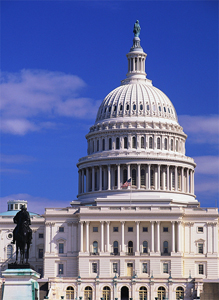 Last month, companion bills were introduced in the House and Senate that would require Federal agencies to develop public access policies relating to research conducted by employees of the agency or using funds administered by the agency. The Fair Access to Science and Technology Research Act of 2013 ("FASTR") was introduced in the House as H.R. 708 by Rep. Michael Doyle (D-PA), and in the Senate as S. 350 by Sen. John Cornyn (R-TX).
Last month, companion bills were introduced in the House and Senate that would require Federal agencies to develop public access policies relating to research conducted by employees of the agency or using funds administered by the agency. The Fair Access to Science and Technology Research Act of 2013 ("FASTR") was introduced in the House as H.R. 708 by Rep. Michael Doyle (D-PA), and in the Senate as S. 350 by Sen. John Cornyn (R-TX).
The legislation begins by listing the following findings of Congress:
(1) the Federal Government funds basic and applied research with the expectation that new ideas and discoveries that result from the research, if shared and effectively disseminated, will advance science and improve the lives and welfare of people of the United States and around the world;
(2) the Internet makes it possible for this information to be promptly available to every scientist, physician, educator, and citizen at home, in school, or in a library; and
(3) the United States has a substantial interest in maximizing the impact and utility of the research it funds by enabling a wide range of reuses of the peer-reviewed literature that reports the results of such research, including by enabling computational analysis by state-of-the-art technologies.
In view of these findings, the legislation would require Federal agencies with research expenditures of more than $100,000,000 "to develop a Federal research public access policy that is consistent with and advances the purposes of the Federal agency" within one year of the Act's enactment. Public access policies developed pursuant to the Act would have to provide for the submission to the Federal agency of manuscripts accepted for publication in peer-reviewed journals that result from research that has been supported by Federal funding. Submitted manuscripts would then be made available online to the public no later than six months after publication.
Under the Act, the public access policies would apply to researchers employed by the Federal agency whose works remain in the public domain and researchers funded by the Federal agency. The Act, however, would exclude the following from the public access policies developed under the legislation (emphasis added):
(1) research progress reports presented at professional meetings or conferences;
(2) laboratory notes, preliminary data analyses, notes of the author, phone logs, or other information used to produce final manuscripts;
(3) classified research, research resulting in works that generate revenue or royalties for authors (such as books) or patentable discoveries, to the extent necessary to protect a copyright or patent; or
(4) authors who do not submit their work to a journal or works that are rejected by journals.
The Act also indicates that each Federal agency required to develop a public access policy would have to submit a report on the policy to the Committee on Homeland Security and Governmental Affairs of the Senate; Committee on Oversight and Government Reform of the House of Representatives; Committee on Science and Technology of the House of Representatives; Committee on Commerce, Science, and Transportation of the Senate; Committee on Health, Education, Labor, and Pensions of the Senate; and any other committee of Congress of appropriate jurisdiction.
The House bill, which was co-sponsored by Rep. Zoe Lofgren (D-CA) and Rep. Kevin Yoder (R-KS), was referred to the to the House Committee on Oversight and Government Reform, and the Senate bill, which was co-sponsored by Sen. Ron Wyden (D-OR), was referred to the Senate Committee on Homeland Security and Governmental Affairs.
In a press release issued by his office, Rep. Doyle stated that the legislation would "give the American people greater access to the important scientific research results they’ve paid for," adding that "[s]upporting greater collaboration among researchers in the sciences will accelerate scientific innovation and discovery, while giving the public a greater return on their scientific investment." He also indicated that "taxpayers should not be required to pay twice for federally-funded research." According to the press release, FASTR builds on the successful implementation by the National Institutes of Health (NIH) of a public access policy in 2008.